中国网络流行语之英语现象
- 格式:doc
- 大小:26.00 KB
- 文档页数:6
![中英混搭式网络语言探析[精品资料]](https://uimg.taocdn.com/daa6aa3ae3bd960590c69ec3d5bbfd0a7956d533.webp)
中英混搭式网络语言探析-精品资料本文档格式为WORD,感谢你的阅读。
最新最全的学术论文期刊文献年终总结年终报告工作总结个人总结述职报告实习报告单位总结摘要:近年来随着互联网的兴起与发展,网络流行语层出不穷,中英文的混搭形式就是网络语言中一种重要的类型。
在社会语言学中,这种中英夹杂使用的现象被称为“语码混用”(code-mixing),也就是把两种不同的语言或结构相融合而形成的一种特殊形式,它是汉语与英语相互接触的必然结果,同时也体现了中西文化的融合。
由于这种网络语言反映了时代的变化,是社会发展的产物,因此散发着时代的气息。
论文通过对网络语言进行界定,归纳网络语言中英混搭的四种类型,即英语单词与汉语混搭,英语句子与汉语混搭,英语词缀与汉语混搭以及特殊形式的混搭。
关键词:网络语言;中英混搭;形式作者简介:宫敏,学校:广西师范大学,专业:汉语国际教育。
[]:H195 []:A[]:1002-2139(2013)-32--01一、界定网络语言是伴随着网络的发展而新兴的一种有别于传统平面媒介的语言形式,是网民创造在网络交流中使用的一种媒体语言。
我国学者于根元认为,网络语言起初多指网络的计算机语言,又指网络上使用的有自己特点的自然语言。
中英混搭式网络语言是网络语言中一种重要的类型。
二、中英文混搭式网络语言的表现形式在经济全球化的大背景下,随着经济的发展和科学技术的进步,世界的联系越来越紧密,而语言作为文化的载体也伴随着各国之间的交往相互交融,这种现象成为近年来社会语言学研究领域颇受关注的热点话题。
这里主要探析的是语言交融在网络语言中的体现。
它是网络语言众多类型之一,这种新一代网络热词顺应着时尚界流行的“混搭风潮”,而字面意思大多折射着社会现实,因此它们大都是在一定背景下产生。
武汉大学文学院教授、博导昌切说,这些混搭的网络词汇都是“中国式英语”,作为网络热词,它们必须和社会热点相结合,这样才能流行起来,但热点一旦过去,这些词汇也就丧失了生命力。

从社会语言学角度透视网络流行语中英文语码转换现象发表时间:2013-11-08T16:34:33.500Z 来源:《中国科技教育·理论版》2013年第8期供稿作者:廉玉香[导读] 近年来,英语普及的程度越来越深,网络语言也渐渐的开始流行,因此出现了大量中文、英文结合的网络流行语言。
廉玉香天津青年职业学院 300191 摘要如今,网络技术迅速的发展,网民的数量也在不断地增多,据统计,截止到2013年1月底,我国的网民数量达到了5.6亿左右。
同时,网民的增多也使得网络语言逐渐的延伸和发展,这种网络语言来自于网友本身,虽然并不具有规范性,但却在网民中受到热捧。
笔者从社会语言学的角度出发,分析了网络流行语中的英文语码转换现象,希望对广大的相关工作者能够有所帮助。
关键词网络语言语码社会现象一、网络流行语的含义网络流行语指的是网民在网络上进行交流的时候,所运用的一种约定俗成的表达方式,使用这种语言的网民有两大特征,第一是年轻,第二是喜欢追逐流行。
如今,网络语言已经不仅仅局限于网络中了,而是延伸到了社会语言中,因此,我们在日常生活中常常可听见有的人的说,“打酱油、被雷到了、神马都是浮云”之类的话语,其中有一句“恨爹不成钢“成为了2010年度最流行的网络语言。
由此可见网民空前爆发的戏谑力以及网络的巨大力量。
二、网络流行语中英文语码转换现象(一)对语料进行分析要知道什么是语码转换,首先我们要来看一组短语:1.你现在还在用这样的装备,你out了。
2.I服了you。
3.吃饭ing。
第一个句子中的out是一个英语词汇,也是一个简写词,原本为“out of time”,表示下台的,出局的,或者不合时间的。
但是,在网络语言中,人们却用它来表示“落伍、跟不上时代 ”的含义。
第二个句子中,出现了英语和中文两种不同的语言,其目的是在语用的环境下,根据需要来进行两种语言的转换,从而取得最佳的表达效果。
第三个句子中的ing表示正在进行中的事情,通过汉语谓词性成分加英语词尾ing,这种在汉语中加入英语的做法,因为很新潮,所以受到大多数年轻网民的青睐。
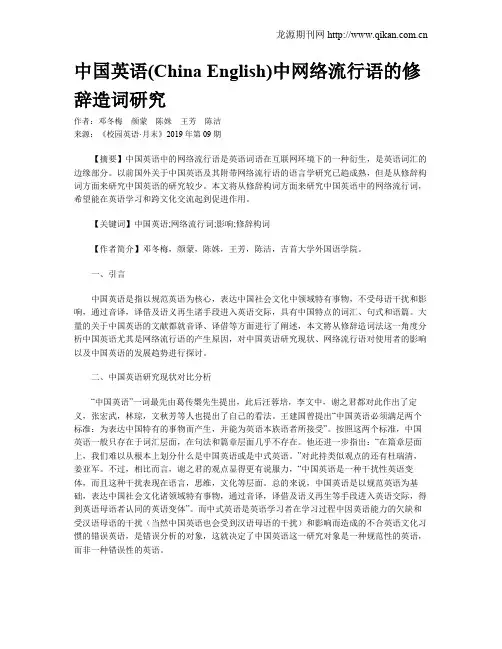
中国英语(China English)中网络流行语的修辞造词研究作者:邓冬梅颜蒙陈姝王芳陈洁来源:《校园英语·月末》2019年第09期【摘要】中国英语中的网络流行语是英语词语在互联网环境下的一种衍生,是英语词汇的边缘部分。
以前国外关于中国英语及其附带网络流行语的语言学研究已趋成熟,但是从修辞构词方面来研究中国英语的研究较少。
本文将从修辞构词方面来研究中国英语中的网络流行词,希望能在英语学习和跨文化交流起到促进作用。
【关键词】中国英语;网络流行词;影响;修辞构词【作者简介】邓冬梅,颜蒙,陈姝,王芳,陈洁,吉首大学外国语学院。
一、引言中国英语是指以规范英语为核心,表达中国社会文化中领域特有事物,不受母语干扰和影响,通过音译,译借及语义再生诸手段进入英语交际,具有中国特点的词汇、句式和语篇。
大量的关于中国英语的文献都就音译、译借等方面进行了阐述,本文將从修辞造词法这一角度分析中国英语尤其是网络流行语的产生原因,对中国英语研究现状、网络流行语对使用者的影响以及中国英语的发展趋势进行探讨。
二、中国英语研究现状对比分析“中国英语”一词最先由葛传槼先生提出,此后汪蓉培,李文中,谢之君都对此作出了定义,张宏武,林琼,文秋芳等人也提出了自己的看法。
王建国曾提出“中国英语必须满足两个标准:为表达中国特有的事物而产生,并能为英语本族语者所接受”。
按照这两个标准,中国英语一般只存在于词汇层面,在句法和篇章层面几乎不存在。
他还进一步指出:“在篇章层面上,我们难以从根本上划分什么是中国英语或是中式英语。
”对此持类似观点的还有杜瑞清,姜亚军。
不过,相比而言,谢之君的观点显得更有说服力,“中国英语是一种干扰性英语变体,而且这种干扰表现在语言,思维,文化等层面。
总的来说,中国英语是以规范英语为基础,表达中国社会文化诸领域特有事物,通过音译,译借及语义再生等手段进入英语交际,得到英语母语者认同的英语变体”。
而中式英语是英语学习者在学习过程中因英语能力的欠缺和受汉语母语的干扰(当然中国英语也会受到汉语母语的干扰)和影响而造成的不合英语文化习惯的错误英语,是错误分析的对象,这就决定了中国英语这一研究对象是一种规范性的英语,而非一种错误性的英语。
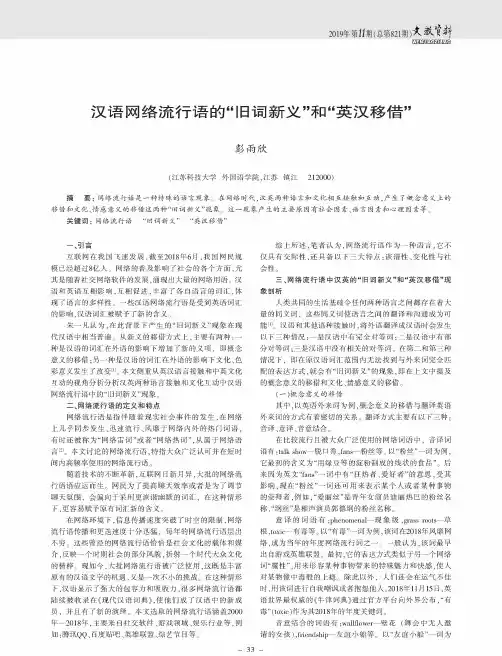
汉语网络流行语的"旧词新义''和"英汉移借#彭雨欣(江苏科技大学外国语学院,江苏镇江212000)摘要:网络流行语是一种特殊的语5现象。
在网络时代,汉英两种语言和文化相互接触和互动,产生了概念意义上的移借和文化、情感意义的移借这两种“旧词新义”现象。
这一现象产生的主要原因有社会因素、语5因素和心理因素等。
关键词:网络流行语“旧词新义”“英汉移借”一、引言互联网在我国飞速发展,截至2018年6月,我国网民规模已经超过8亿人。
网络的普及影响了社会的各个方面,尤其是随着社交网络软件的发展,涌现出大量的网络用语。
汉语和英语互相影响,互相促进,丰富了各自语言的词汇,体现了语言的多样性。
一些汉语网络流行语是受到英语词汇的影响,汉语词汇被赋予了新的含义。
朱一凡认为,在此背景下产生的“旧词新义”现象在现代汉语中相普。
从新义的,:一是汉语的词汇在语的影响下增加了新的义项,即概念意义的;另一种是汉语的词汇在外语的影响下文、色彩意义发生了[1+。
本文英汉语言和中英文化互动的汉英语言和文互汉语网络流行语的“旧词新义”现$二、网络流行语的定义和特点网络流行语是随着现社会件的发生,在网络发生、速流行、网络的词语,被为“网络雷词”“网络词”,网络语言叫文的网络流行语,特指大认在'用的网络流行语。
随着的新,互联网新月,大的网络流行语语生$网民为了是为了',会用的词汇,在下,予词汇新的含义$在网络下,速了的,网络流行语和速,年的网络流行语层出穷$些曾经的网络流行语恰恰是社会文的载体和媒介,反映一个期社会的部貌,折射一个大文的精粹$现如今,大批网络流行语被广泛使用,这既是丰富的汉语文字的机遇,又是一次小的挑战。
在下,汉语显示了强大的包力和吸收力,很多网络流行语都陆续被收录在《现代汉语词典》,他们成了汉语中的新成员,且了新的演绎$文选取的网络流行语涵盖2000年一2018年,来自社交软件、游戏领域、娱乐行业等,例如:腾讯QQ、百度贴吧、英雄联盟、综艺目等。
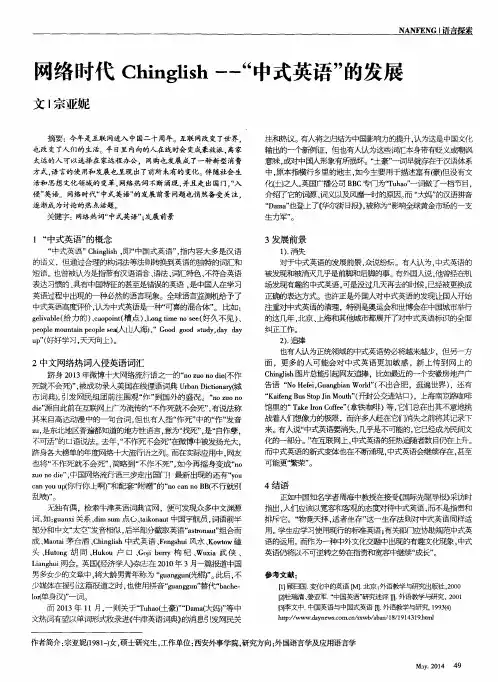
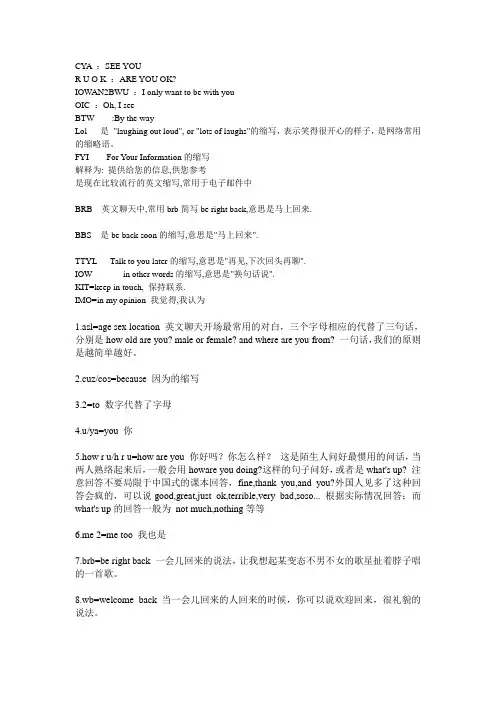
CY A :SEE YOUR U O K :ARE YOU OK?IOWAN2BWU :I only want to be with youOIC :Oh, I seeBTW :By the wayLol 是"laughing out loud", or "lots of laughs"的缩写,表示笑得很开心的样子,是网络常用的缩略语。
FYI For Your Information的缩写解释为: 提供给您的信息,供您参考是现在比较流行的英文缩写,常用于电子邮件中BRB 英文聊天中,常用brb简写be right back,意思是马上回来.BBS 是be back soon的缩写,意思是"马上回来".TTYL Talk to you later的缩写,意思是"再见,下次回头再聊".IOW in other words的缩写,意思是"换句话说".KIT=keep in touch, 保持联系.IMO=in my opinion 我觉得,我认为1.asl=age sex location 英文聊天开场最常用的对白,三个字母相应的代替了三句话,分别是how old are you? male or female? and where are you from? 一句话,我们的原则是越简单越好。
2.cuz/cos=because 因为的缩写3.2=to 数字代替了字母4.u/ya=you 你5.how r u/h r u=how are you 你好吗?你怎么样?这是陌生人问好最惯用的问话,当两人熟络起来后,一般会用howare you doing?这样的句子问好,或者是what's up? 注意回答不要局限于中国式的课本回答,fine,thank you,and you?外国人见多了这种回答会疯的,可以说good,great,just ok,terrible,very bad,soso... 根据实际情况回答;而what's up的回答一般为not much,nothing等等6.me 2=me too 我也是7.brb=be right back 一会儿回来的说法,让我想起某变态不男不女的歌星扯着脖子唱的一首歌。
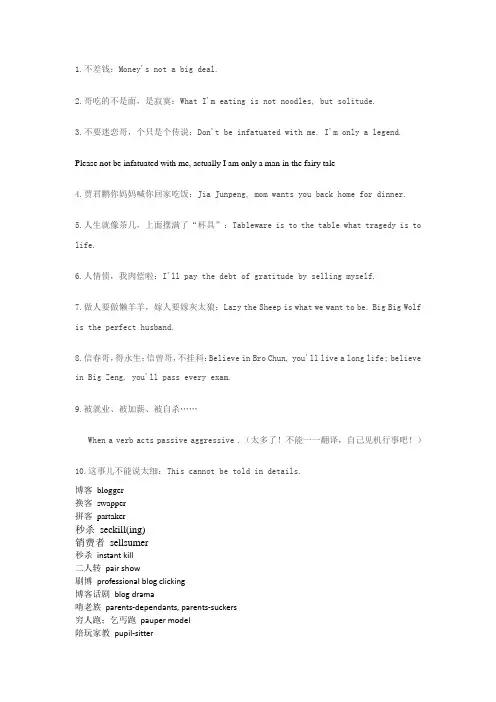
1.不差钱:Money's not a big deal.2.哥吃的不是面,是寂寞:What I'm eating is not noodles, but solitude.3.不要迷恋哥,个只是个传说:Don't be infatuated with me. I'm only a legend.Please not be infatuated with me, actually I am only a man in the fairy tale4.贾君鹏你妈妈喊你回家吃饭:Jia Junpeng, mom wants you back home for dinner.5.人生就像茶几,上面摆满了“杯具”:Tableware is to the table what tragedy is to life.6.人情债,我肉偿啦:I'll pay the debt of gratitude by selling myself.7.做人要做懒羊羊,嫁人要嫁灰太狼:Lazy the Sheep is what we want to be. Big Big Wolf is the perfect husband.8.信春哥,得永生;信曾哥,不挂科:Believe in Bro Chun, you'll live a long life; believe in Big Zeng, you'll pass every exam.9.被就业、被加薪、被自杀……When a verb acts passive aggressive .(太多了!不能一一翻译,自己见机行事吧!)10.这事儿不能说太细:This cannot be told in details.博客blogger换客swapper拼客partaker秒杀seckill(ing)销费者sellsumer秒杀instant kill二人转pair show刷博professional blog clicking博客话剧blog drama啃老族parents-dependants, parents-suckers穷人跑;乞丐跑pauper model陪玩家教pupil-sitter非主流Non-mainstream高考状元top examinee for higher education破格录取exceptive admission豆腐渣工程slack project贫二代the second generation of paupers月嫂confinement nurse1.给力 gelivable给力,在地方方言中就是“带劲儿”、“牛”、“酷”的意思;用作动词,指“给以力量”、“加油”。
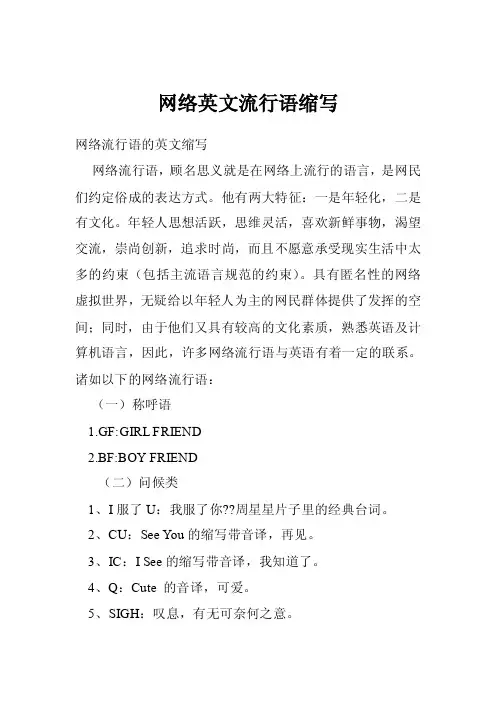
网络英文流行语缩写网络流行语的英文缩写网络流行语,顾名思义就是在网络上流行的语言,是网民们约定俗成的表达方式。
他有两大特征:一是年轻化,二是有文化。
年轻人思想活跃,思维灵活,喜欢新鲜事物,渴望交流,崇尚创新,追求时尚,而且不愿意承受现实生活中太多的约束(包括主流语言规范的约束)。
具有匿名性的网络虚拟世界,无疑给以年轻人为主的网民群体提供了发挥的空间;同时,由于他们又具有较高的文化素质,熟悉英语及计算机语言,因此,许多网络流行语与英语有着一定的联系。
诸如以下的网络流行语:(一)称呼语1.GF:GIRL FRIEND2.BF:BOY FRIEND(二)问候类1、I服了U:我服了你??周星星片子里的经典台词。
2、CU:See You的缩写带音译,再见。
3、IC:I See的缩写带音译,我知道了。
4、Q:Cute 的音译,可爱。
5、SIGH:叹息,有无可奈何之意。
6、LOL:Laugh Out Loud,大笑。
7、BTW:By the way,顺便说一句。
8、BRB:Be right back,马上回来。
9、TTYL:Talk to you later,回头再谈。
10、BBL:Be back later,过会儿就回。
11、kick your ass:打你屁屁。
12、PPL:people,人们。
13、PLZ:please,请,也有缩写成PLS。
14、RUOK:Are you OK?15、IOWAN2BWU:I only want to be with you。
16、M$ULKeCraZ:Miss you like crazy。
17、CUL8R:see you later。
18、IMHO:In my humble opinion。
19,ME TOO: 我吐20.CYA:SEE YOU21.R U O K:ARE YOU OK?22.白白:再见23.OIC: OH,I SEE.24.OICQ: OH ,I SEEK YOU.(三)与数字有关的用语1.886:BYE BYE2.3Q:THANK YOU.3.419 :for one night 一夜情(根据英语发音)(四)其它用语1、BT:①Bit Torrent的缩写,是一种P2P(点对点)共享软件2. BBS~:波霸(BIG~breast~sister)~3、SOHO:Small Office Home Officer的简称,意思是:在家办公。

1.不差钱:Money's not a big deal.2.哥吃的不是面,是寂寞:What I'm eating is not noodles, but solitude.3.不要迷恋哥,个只是个传说:Don't be infatuated with me. I'm only a legend.Please not be infatuated with me, actually I am only a man in the fairy tale4.贾君鹏你妈妈喊你回家吃饭:Jia Junpeng, mom wants you back home for dinner.5.人生就像茶几,上面摆满了“杯具”:Tableware is to the table what tragedy is to life.6.人情债,我肉偿啦:I'll pay the debt of gratitude by selling myself.7.做人要做懒羊羊,嫁人要嫁灰太狼:Lazy the Sheep is what we want to be. Big Big Wolf is the perfect husband.8.信春哥,得永生;信曾哥,不挂科:Believe in Bro Chun, you'll live a long life; believe in Big Zeng, you'll pass every exam.9.被就业、被加薪、被自杀……When a verb acts passive aggressive .(太多了!不能一一翻译,自己见机行事吧!)10.这事儿不能说太细:This cannot be told in details.博客blogger换客swapper拼客partaker秒杀seckill(ing)销费者sellsumer秒杀instant kill二人转pair show刷博professional blog clicking博客话剧blog drama啃老族parents-dependants, parents-suckers穷人跑;乞丐跑pauper model陪玩家教pupil-sitter非主流Non-mainstream高考状元top examinee for higher education破格录取exceptive admission豆腐渣工程slack project贫二代the second generation of paupers月嫂confinement nurse1.给力 gelivable给力,在地方方言中就是“带劲儿”、“牛”、“酷”的意思;用作动词,指“给以力量”、“加油”。

预约券reservation ticket下午茶high tea微博Microblog裸婚naked wedding亚健康sub-health平角裤boxers愤青young cynic灵魂伴侣soul mate小白脸toy boy精神出轨soul infidelity人肉搜索flesh search浪女dillydally girl公司政治company politics剩女3S lady(single,seventies,stuck)/left girls 山寨copycat异地恋long-distance relationship性感妈妈yummy mummy钻石王老五diamond bachelor时尚达人fashion icon御宅otaku上相的,上镜头的photogenic脑残体leetspeak学术界academic circle哈证族certificate maniac偶像派idol type住房公积金housing funds个税起征点individual income tax threshold熟女cougar(源自电影Cougar Club)挑食者picky-eater伪球迷fake fans紧身服straitjacket团购group buying奉子成婚shotgun marriage婚前性行为premarital sex开博to open a blog家庭暴力family/domestic volience问题家具problem furniture炫富flaunt wealth决堤breaching of the dike上市list share赌球soccer gambling桑拿天sauna weather自杀Dutch act假发票fake invoice落后产能outdated capacity二房东middleman landlord入园难kindergarten crunch生态补偿ecological compensation金砖四国BRIC countries笑料laughing stock泰国香米Thai fragrant rice学历造假fabricate academic credentials泄洪release flood waters狂热的gaga eg: I was gaga over his deep blue eyes when I first set eyes on him 防暑降温补贴high temperature subsidy暗淡前景bleak prospects文艺爱情片chick flick惊悚电影slasher flick房奴车奴mortgage slave上课开小差zone out万事通know-it-all毕业典礼commencement散伙饭farewell dinner毕业旅行after-graduation trip节能高效的fuel-efficient具有时效性的time-efficient死记硬背cramming很想赢be hungry for success面子工程face job指甲油nail varnish射手榜top-scorer list学历门槛academic threshold女学究blue stocking王牌主播mainstay TV host招牌菜signature dishes非正常死亡excess death影视翻拍plays reshooting四大文学名著the four masterpieces of literature城市热岛效应urban heat island effect逃学play hooky, 装病不上班play hooky from work一线城市first-tier cities高考the National College Entrance Examines录取分数线admission scores小型警车panda car老爷车vintage car保障性住房indemnificatory housing一决高下Duke it out差别电价differential power prices囤积居奇hoarding and profiteering灰色市场Grey market反倾销anti-dumping经济二次探底double dip吃白食的人freeloader橙色预警orange signal warning公关public relation不幸的日子,不吉利的日子black-letter day吉利的日子saints' days人肉搜索flesh search廉租房low rent housing限价房capped-price housing经适房affordable housing替罪羔羊whipping boy对口支援partner assistance扫把星jinx资本货物capital goods初级产品primary goods商业服务commercial service最终消费品final consumption goods原材料raw material制成品manufactured goods重工业heavy industry贸易顺差trade surplus外汇储备foreign exchange reserve潮人:trendsetter发烧友:fancier骨感美女:boney beauty卡奴:card slave蹦迪:disco dancing电脑游戏迷:gamer家庭主男:house-husband小白脸,吃软饭的:kept man二奶:kept woman麦霸:Mic king / Mic queen型男:metrosexual man(范指那些极度重视外貌而行为gay化的直男,型男属于其中的一种)新新人类:new-new generation另类:offbeat菜鸟:rookie“色”友(摄影爱好者):shutterbug驴友:tour pal娘娘腔:sissy负翁:spend-more-than-earn全职妈妈:stay-at-home mom裸奔:streaking80后:80's generation百搭:all-match肚皮舞:belly dance片前广告:cinemads角色扮演:cosplay情侣装:couples dress电子书:e-book电子杂志:e-zine胎教:fetal education限时抢购:flash sale合租:flat-share期房:forward delivery housing荧光纹身:glow tattoo团购:group purchase健商:HQ扎啤:jug beer八卦,丑闻:kiss and tell低腰牛仔裤:low-rise jeans泡泡袜:loose socks裸妆:nude look普拉提:Pilates黄牛票:scalped ticket透视装:see-through dress扫货:shopping spree烟熏妆:smokey-eye make-up水货:smuggled goods热裤:tight pants舌钉:tongue pin纳米技术:nanotechnology通灵:psychic文凭热degree craze反腐败anti-corruption联合军演joint military drill财政赤字budget deficit拜倒在某人的石榴裙下throw oneself at sb's feet 打破记录break a record创造新纪录create a new record终生学习lifelong learning天气保险weather insurance正妹hotty对某人念念不忘get the hots for希望把好运带来给自己touch wood婚外恋extramarital love; extramarital affair职场冷暴力emotional office abuse赞助费sponsorship fee抚恤金financial compensation,compensation payment 草莓族Strawberry generation草根总统grassroots president点唱机juke box笨手笨脚have two left feet演艺圈Showbiz核遏制力nuclear deterrence试点,试运行on a trial basis精疲力竭be dead on one's feet软禁be under house arrest拼车car-pooling解除好友关系unfriend v.发送色情短信sexting暴走go ballistic婚检premarital check-up天书mumbo-jumbo情意绵绵的lovey-dovey漂亮女人tomato(俚语);妖娆女子cheese cake懦夫quitter(俚语)母校alma mater非难a kick in the pants黑马black horse挥金如土spend money like water意外怀孕unplanned pregnancy人流artificial abortion operation避孕措施contraceptives生殖健康reproductive health海外代购overseas purchasing试镜screen test访谈节目chat show智力竞赛节目quiz show武侠片martial arts film封面报道cover story跳槽jump ship闪婚flash marriage闪电约会speeddating闪电恋爱whirlwind romance刻不容缓,紧要关头crunch time健身bodybuilding遮阳伞parasol人渣scouring头等舱first-class cabin世界遗产名录the world heritage list乐活族LOHAS(Lifestyle Of Health And Sustainability)安乐死euthanasia私生子an illegitimate child; a love child。

关于网络流行语的看法的英语作文全文共3篇示例,供读者参考篇1The Way We Talk on the InternetHi there! My name is Jamie and I'm 10 years old. Today I want to talk to you about the way kids like me speak on the internet and use different slang words and phrases. It's kind of a funny topic when you think about it - grown-ups are always saying "kids these days" and shaking their heads at how we communicate online. But to me and my friends, it just feels natural!Let me start by explaining what slang is. Slang refers to informal words and phrases that are more common in spoken language, especially by particular groups of people. On the internet, there are lots of slang terms that get shared around through social media, messaging apps, online videos and games. They spread like wildfire because they're fun, catchy and make you feel like part of an in-group.Some of my favorite slang words that everyone uses online are "slay" (to do something excellently), "vibe" (the mood oratmosphere), "salty" (bitter or upset) and "sus" (suspicious). Those are just the start - there's a huge dictionary of internet slang out there that's constantly growing and evolving. New slang pops up all the time and spreads through memes, viral videos and jokes. It's an endless trend that will likely never stop!I remember when I first started seeing slang phrases like "that's lit" (meaning that's amazing) and "I'm dead" (meaning I'm laughing uncontrollably). At first I was really confused, but then I realized it was just a new way that kids my age were expressing themselves online. Once you learn the latest slang, it becomes a shared language that makes conversing a lot more fun on apps and games.A lot of adults think internet slang is just a bunch ofmade-up gibberish. But to me, it's a creative way to communicate experiences and emotions that plain English doesn't fully capture. Like when I'm feeling "snatched" (looking super good) or I see something "crispy" (fresh and trendy). There's an art to coming up with slang terms that vividly express what you want to say.Of course, parents and teachers get worried that slang will become a bad habit that clouds our ability to speak and write properly. They have a fair point - if all I did was use slang, mycommunication skills would definitely suffer. That's why it's good to be able to "code-switch" between formal language for school or work, and informal slang when chatting with friends online.Slang also helps connect me with communities that I'm part of on the internet. Like when I'm playing online multiplayer games, using the right gaming slang helps me bond with my teammates and understand their callouts during matches. Or in my favorite streamers' chats, there's always hilarious new slang popping up that only we loyal fans know the meaning of. It breeds a sense of camaraderie, you know?At the end of the day, I don't think slang is just a fleeting trend. It's a evolving language that has been around for ages and will keep on changing with each generation. The version we use on the internet these days is just an extension of that, blending teenage informal speak with online memes and culture. explosionnumbersSo should you be worried about your kids using too much internet slang? Maybe just a little - but I also think it's just part of growing up in the digital age. As long as we know when to use it appropriately (and when not to), it's all just a bit of harmless fun between friends. It adds color and zest to our online conversations. And who knows, some of the slang your kidstaught you might even become a permanent part of the English language one day!Slang or not, my hot take is that communication is all about connecting with people and making yourself understood, whether that's online or IRL (in real life). And for me, nothing beats having a laugh with my besties using our shared dialect of memes, emotes and slang terms. Just plz don't ask me to stop anytime soon, okay? I'm begging you fam! That would be a mega-L (huge loss) if I couldn't keep sprinkling my speech with internet sass. I gotta stay osnatchemic (on-trend) you know what I'm saying?篇2The Weird and Wonderful World of Internet SlangHi there! My name is Jamie and I'm 10 years old. Today I want to tell you all about the crazy language that gets used online and in memes. Some of it is really confusing, but other bits are just plain funny!Things move super fast on the internet. New slang words, acronyms, and memes are constantly popping up and going viral. It can be hard to keep track of it all! By the time us kids havefigured out what the latest saying or joke means, it's often already becoming old news.One type of internet slang that's really popular right now is acronyms. You've probably heard some of the common ones like "lol" for "laughing out loud" or "brb" meaning "be right back." Those have been around for ages. But there are always new, zanier ones entering the online language too.Some of the sillier acronyms I've seen lately are "IWSN" ("I want santa now"), "PMJG" ("pardon my jibber gabber"), and "WLITAF" ("why life is the ask factory?"). Those don't really make any sense, which is part of what makes them funny meme-speak!Then there are the odd slang words that get big for a while before fading away. Like how a few years ago, everybody online was saying "slay" as an alternative to "awesome" or "cool." Or how my older sister always tells me how "yeet" used to be a big thing for expressing excitement. To yeet something was to throw it really hard, I'm told.The meanings of these slang terms can seem totally random. Why did "mid" become the new "mediocre?" Who decided "no cap" should mean "no lie?" I have no clue, but using bizarre language is part of what makes internet culture so entertaining.Of course, a lot of online slang these days comes from memes. You know, those crazy videos, images, or phrases that get shared over and over until they become viral sensations. Like the laughing Troll kid or the "Woman Yelling at Cat" couple.The text that gets added to memes is where some true masterpieces of nonsensical slang get created. One of my favorites is the phrase "he need some milk" which gets associated with images of people looking confused or scared. Or there's the recent "brain OP" meme, with "OP" standing for "overpowered." That one makes me laugh every time.Probably the single weirdest piece of meme slang I've encountered is "shloobishuggah." It seems to have originated from someone trying to sound out a jazzy bass line, and now it's become shorthand online for any kind of silly nonsense word. Using "shloobishuggah" in a sentence is the slang equivalent of improvising a meaningless riff while making jazz hands.My friends and I spend way too much time browsing memes and repeating the latest catchphrases from social media. We'll be out on the playground, goofing around and shouting "sheeeeeesh" at each other (that's slang for showing appreciation for something cool). Or we'll randomly yell "okay,boomer!" at our teachers if they do something remotely out of touch or old-fashioned. Haha, oops, my bad!I have to be honest though – a lot of this online lingo goes completely over my head. How does a grumpy looking animal with the words "claim to be sleep" count as humor? Your guess is as good as mine. And don't even get me started on whatever cryptobros are saying with all their monkey illustrations and number symbols. That's a whole other level of weird internet patois.As confusing and inaccessible as meme slang can seem, I still love how creative and unpredictable it all is. There's something undeniably fun about collective weirdness on such a massive scale. One minute, you're all making jokes about digital apes and pixelated punks. The next minute, that's all been cancelled and everybody's posting about beans or frogs for some reason. It's absolute madness!Who knows what new memes and strange ways of speaking will take over this year? There's no way to predict it, which is what makes internet culture so exciting. Will we all start using "zamn" and "sheeesh" ironically in 2023? Or will those slang words instantly become cringe and get replaced by something even more bizarre? Only time will tell.One thing is for sure: kids today are part of an amazing revolution in modern language. Online slang is evolving faster than any dictionary can keep up with. It's a living, evolvingsilly-speak that brings people together under a shared love of absurdity. Sure, a lot of it is incomprehensible gibberish. That's what makes it an absolute shloobishuggah!篇3The Weird World of Internet SlangYou know how grown-ups are always saying things like "kids these days" and shaking their heads? Well, I'm a kid, and I've got my own thoughts on how "these days" are different because of all the new internet slang words that have become popular. It's a totally weird world of abbreviations, misspellings, and made-up words that didn't exist back when my parents were kids.Take "LOL" for example. When I first saw that, I thought someone was just being a really bad speller. But then I learned it means "laughing out loud" and people use it to show they think something is funny in their texts and online messages. At first, I didn't get why we needed a whole new code word for laughing when the regular word works just fine. But now I'm totally guiltyof using "LOL" myself sometimes, especially when I'm trying to respond quickly.Then there's "IKR" which means "I know, right?" I overheard some older kids using that one on the playground last week and had to ask them what it meant. When they told me, I actually did know what they meant and agreed with their point, so I guess IKR made sense in that situation? But it seems like such a weird way to abbreviate such a simple phrase.My personal favorite funny internet slang term, though, has to be "YOLO." This crazy word is supposed to mean "you only live once," which I think is a pretty deep philosophical idea for the internet slang crowd to be broadcasting. Every time I see someone type "YOLO," I imagine them striking a dramatic pose like a famous philosopher from ancient times while wearing a vintage T-shirt and staring pensively into the distance. Yeah, real profound stuff there, YOLO dude.Of course, there are plenty of other bizarre internet slang terms out there, and new ones seem to be popping up all the time. There's "FOMO" (fear of missing out), "TBH" (to be honest), "LIT" (amazing or exciting), and way too many more to list. Half the time, I haven't got a clue what these abbreviations and made-up words even mean.I have to wonder, do we really need a completely new vocabulary just for typing out messages on our phones and computers? Don't get me wrong, I'm all about keeping up with the latest trends and fitting in with my friends and peers. But sometimes I think this internet slang revolution has gone a little too far. It's like we're rewriting the entire dictionary, one abbreviation at a time!And let's not even get started on how ridiculous some of these new slang words sound when you actually say them out loud. I accidentally let a few of them slip during an in-person conversation the other day, and my parents looked at me like I had literally started speaking another language. Which I kind of had, I guess? Imagine looking at your kid and hearing them say "that new game is super lit, but I have FOMO about missing the latest episode of my favorite show, so YOLO, IKR!" You'd probably be wondering what alternate universe they learned to communicate in.Despite all my joking, I actually don't mind using some of the more common internet slang terms once in a while when I'm chatting with my friends online or over text. They can be kind of fun and make me feel like I'm part of an exclusive club that has its own unique code words. And hey, maybe coming up withcreative new vocabulary is helping to expand our minds in weird and unexpected ways?But at the end of the day, I really do hope we don't completely abandon normal language and communication just because a bunch of shorthand text slang became popular on the internet. Whenever I'm writing something important for school or wanting to have a serious conversation, you can bet I'll be using actual complete words and sentences rather than a jumbled mess of letters and abbreviations.So while I may giggle at "YOLO" every now and then with my friends, I don't plan on adopting it as my new personal life motto anytime soon. Call me old-fashioned, but I still think there's a lot of value in being able to express yourself clearly using real words. Or as they would have said back in the ancient times... "LOL YOLO IKR?"。
论网络流行语现象作文800字英文回答:The prevalence of internet slang terms is an intriguing phenomenon that has profoundly impacted online communication. It has become a prevalent means of self-expression, fostering a sense of community among internet users. These terms, often characterized by their playful nature and brevity, serve as a unique and ever-evolving language that transcends geographical and cultural boundaries.The origins of internet slang can be traced back to the early days of online forums and chat rooms. As users sought to convey messages quickly and efficiently, they began to abbreviate words and invent new terms to express their thoughts and emotions. Over time, these terms gained widespread popularity and became embedded in the lexicon of online communication.One key aspect of internet slang is its ephemeral nature. Terms often emerge and disappear rapidly, replaced by newer and more fashionable expressions. This fluidity reflects the dynamic and ever-changing nature of theinternet itself. However, certain terms have managed to endure and become ingrained in the online vocabulary, such as "lol" (laughing out loud), "IMHO" (in my humble opinion), and "OMG" (oh my god).The use of internet slang has several advantages. Firstly, it allows users to express themselves in a more concise and efficient manner. By abbreviating words and using acronyms, users can convey their thoughts quickly and easily. Secondly, slang terms can foster a sense of community among internet users. By using shared language, individuals can identify with each other and build connections within online spaces. Thirdly, slang can be a powerful tool for expressing humor and irony. The playful and often humorous nature of these terms adds a layer of levity and entertainment to online interactions.However, there are also potential drawbacks associatedwith the use of internet slang. One concern is that it may hinder clear communication, particularly for those who are unfamiliar with the terminology. Additionally, the informal and casual nature of slang can sometimes be perceived as unprofessional or inappropriate in certain contexts.Overall, the phenomenon of internet slang is a fascinating reflection of the ever-evolving nature of language in the digital age. While its advantages and disadvantages should be considered, there is no doubt that it has become an integral part of online communication, shaping the way we express ourselves and interact with others in the virtual realm.中文回答:网络流行词现象已成为一种深刻影响网络交流的有趣现象。
网络语言变异的语法现象及原因分析伴随互联网的出现,网络语言应运而生,它的发展势头强劲,出现了种种陌生的语言现象,如大量的新词、语素出现,表达的方式随意自由,语义的变异等,在使用过程中初步形成了鲜明的个性化特征。
网络语言脱胎于现代汉语,超越现代汉语的常用语法规则,出现了种种变异的语法现象,对流传几千年的汉民族共同语构成了强大的冲击,有如海啸,一时让人们惊恐、忧愁、不知所措。
笔者搜罗网络中常用的语言,对其进行语法分析,并探究它产生的原因。
一、网络语言变异的语法现象(一)取材的随意性、自由性1.构词的随意性目前网络或论坛流行这些语言:“晕”“倒”“偶”“东东”“酱紫”“灌水”“恐龙”“青蛙”“BF”“RPWT”“874”“GG”“MM”……据一位资深网虫解释,“晕”“倒”差不多一个意思,就是对方说的话有点不可思议,不能理解;“偶”是指我,“东东”即东西,“酱紫”是“这样子”的意思;在网上乱留言叫“灌水”,“恐龙”“青蛙”分别指丑女和丑男,“BF”则是英语男朋友的缩写,“RPWT”是人品问题的缩写,874则是表示对人不满时的打击,“GG”是哥哥的意思,“MM”则意指妹妹等等,初涉电脑的人,看不懂,弄不明白,不以为这是天外鸟语才怪呢!这些词语在普通话中是没有的,至少是没有解释的,而在网络中却已习焉不察。
构成网络新词语的词素大多是语言中固有的,它们利用仿拟、飞白、比喻、谐音、拟人等手法构成新词。
2.使用混合句的现象普遍请看下面一段对话:甲:哪儿?乙:上海,U甲:北京。
见到U真高兴乙: me2!呵呵甲:家?乙:no.公司甲:MMorDD?乙:D!我有事,走先,886甲:OIC,BB!这是一段典型的网络语言的对话。
我们可以看到,在不影响沟通的前提下,各种材料可以信手拈来,任意组合,显示出很大的随意性。
汉英混杂,符号和字母混用,在网络语言中十分普遍,有的已经成为网民的惯用语,如“有事请call 我”、3ku(thank you)/CBL(coolbi la )是“酷毙啦”的意思,“大家+u”(加油)等等,可以说是不胜枚举。
当我们平时在聊微信或者面对面聊天时,常会用到一些网络流行语或者常用的俚语,老外也一样。
比如他们会用“RT”来表示“retwitter”,字面意思转发一条twitter,但其实这还表示强烈同意,非常认同。
可以用在朋友们说了一个你很赞同的观点之后,你说RT,就相当于国内的+1。
—— This food is delicious.—— RT.再比如,他们有时候会说“You're green.”这里不是“你被绿了”的意思,而是用来表示“你太没经验了。
”因此,当客户跟你聊message的时候,有时会习惯使用一些俚语,这让他们能更好的表达自己当下的感觉。
而你要做的就是听到的时候“知道他在说什么”。
但请注意,这些俚语适合在社交媒体或非正式场合使用,切不可在正式的书面文体中用哦!以下常用的英语俚语,建议随手收藏,这样跟客户聊天时可以显得更native!1. click:(两人)合得来I think we two really click.我觉得我们两个蛮合得来的。
2. suck:差劲; 糟透了That sucks.差劲!3. eat:使困扰;使不开心What's eating you?什么事让你不开心呢?备注:这是个很常听到的俚语。
当你觉得某个人不大对劲, 就可以用这句话来问发生什么事了。
4. john 厕所I have to go to the john.我要去厕所。
备注:这里的“john”不是约翰的意思,而是指厕所。
5. catch some Zs 小睡一下Sorry. I have to catch some Zs.抱歉!我想小睡一下。
6. kick ass 了不起You just kick ass.厉害了!7. spring for 请客Let me spring for dinner.这一顿我请。
8. hit the road 出发上路了I really need to hit the road.我真的得出发了。
浅谈网络流行语的英文翻译网络流行语(Internet Slang)指的是在网络上广泛流传且被人们频繁使用的一类语言现象。
它以其独特的表达方式和迅速传播的特点,成为网络文化的一部分。
网络流行语对于网络交流起到了丰富、活跃氛围的作用。
在国内,网络流行语代表了一种时尚、潮流的表达方式,经常为人们所嘲笑和模仿。
随着网络的普及和全球化,网络流行语也进入了国际舞台。
在英文世界里也有很多类似的网络流行语。
这些网络流行语在英文中有时被称为“meme”(中文为“迷因”),一词源于英文中的“gene”(基因)。
翻译网络流行语涉及到一种特殊的翻译技巧,需要考虑到源语言和目标语言之间的文化差异和习惯用法。
为了更好地翻译网络流行语,我们可以采用以下几种方法:我们可以选择“音译法”直接翻译网络流行语。
这种方法将网络流行语的发音和韵味保留下来,比较符合原本的习惯用法。
“666”音译为“liùliùliù”,“666”在中文中表示赞叹、佩服的意思。
我们可以选择“意译法”将网络流行语的意思进行翻译。
这种方法相对灵活,可以根据目标语言的文化背景和表达习惯进行翻译。
“996”是中国互联网行业常用的一种工作时间制度,意思是每周工作6天,每天工作9小时。
在英文中可以翻译为“6 days, 9 hours”或者“9 to 9, 6 days a week”,以更好地传达出“996”所代表的工作强度和时间要求。
我们还可以结合“术语法”进行翻译。
网络流行语中有一些特定的术语和短语,在翻译时可以选择保留其原文或者根据目标语言的习惯进行翻译。
“咸鱼”是一种网络流行语,意思是指“混日子、无所事事的人”。
在英文中可以翻译为“slacker”或者“bum”,以表达出相似的意思。
浅谈中国网络流行语之英语现象
摘要:随着科技和经济的发展,交通工具和通讯设备的日益更新,人与人之间、国家与国家之间交流和沟通越来越便捷,必然会带来各个方面的相互影响,而语言首当其冲。
网络语言简洁、形象、彰显个性和时尚等特点也是网络语言流行的重要原因。
由于英语在中国的“全民化”,使中国的网络流行语势必会部分受其影响。
本文就结合目前近几年中国流行网络语言的英语现象进行阐述。
关键词:网络语流行背景;网络语言特点;网络英语元素
中图分类号:h31 文献标识码:a
文章编号:1009—0118(2012)10—0366—02
一、网络语流行的背景
时代背景:21世纪是信息时代,也是网络时代。
网络使人们拥有现实和网络两重不同的世界。
网络的频繁使用,越来越多的人把现实生活中许多重要事务搬到便利的网络上运行。
这就为网络语的流行提供了必要的前提。
社会背景:80后90后和00后是使用网络的主体,这几代人相对于之前的时代各方面的条件都要优越。
比如受教育的条件、物资条件、以及时代所赋予的高科技时代等条件。
这代人懂英语,为网络语中的英语流行成为可能;在网络信息时代,追求速度、追求简洁和时尚,英语中的一些独特的功能和英语字母的缩合形式等成了网民特别喜爱的网络用语之一。
因此,网络流行语中的英语现象也就应运而生。
二、网络语言的特点
语言是时代的反映。
网络语言自然是网络时代的反映。
随着生活节奏的加快,我们崇尚速度和效率。
简洁、快速、便于理解和沟通正是网络语言的一大特点。
网民们在互联网上交流时为了提高交流速度、节约时间和上网费用或是在打字时没有耐性等原因,多用短句或数字等代替。
三、网络流行语中的英语现象
(一)直接英语现象
由于互联网来自美国,因此,很多有关网络的名词不可避免的是英语。
在追求时间和速度的年代,有些名词在传入中国时直接原封不动的照搬过来或音译过来。
如:internet:英特网;email:伊妹儿;bbs:bulletin board system。
blog:博客,talk show脱口秀,copy:铐贝,shopping:血拼cool:酷,fans:粉丝,homepage —主页,microsoft—微软,fashion—时尚,website—网址,tofel —托福,ieltes—雅思等。
(二)英语语法嫁接现象
有些网络流行语不仅出现英语名词直接照搬现象还有英语语法的融合。
汉语动词本身一般不体现“时”和“态”的差别,常在动词前面或后面加上“正在”“着”“了”“过”等词来表示一种正在进行的状态或过去的、完成的状态。
英语动词有“时”和“态”的变化,表现形式上在动词的后面加“—ing、—ed”,这就是我们常说的动词的现在分词和过去分词这一语法范畴。
其中的“—ing、
—ed”是没有实际意义的,只体现一种时态或状态。
“—ing”表示主动的、正在进行的状态;“—ed”表示过去的、完成的或被动的状态。
网民们把汉语的动词和英语动词的语法特点融合在一起,形成了一种“汉语动词+ing/ed符号”的用法;比如:
(1)“你在做什么?”——“我正在做作业。
”
但是在网络上,大部分网民都不会选择这种说法,而会用如下的来表示:
(2)“你在做什么?”——“作业ing”。
或者在汉语动词后加“—ed”来说明动作已经发生或完成。
如:(3)“吃饭—ed”表示已经吃过饭了。
(三)英语缩略语现象
网络流行语顾名思义就是在网络上被网民认可接受且随着使用
者越来越多而流行起来的。
网络是为网民提供网络交流的一个平台,为了提高交流速度、节约时间和上网费用或是在打字时没有耐性等原因,除了喜欢使用简短的句子之外,还有一个显著的特点就是大量使用缩略语和数字。
英语中本身就含有很多的缩略语,有些自然而然就被网民给用上了。
如:(1)asap:as soon as possible,尽快;(2)lol:laugh out loud,大笑;(3)btw:by the way,顺便说一句;(4)bbl:be back later,过会回来;(5)brb:be right back,马上回来;(6)ttyl:talk to you later,再见,下次回头再谈;(7)a/s/l?=age/sex/location?=年龄/性别/所在地。
当然,网络流行语中的某些缩略语形式被本土化了,很有中国特色。
如:hhp,网络用语。
ha ha point的缩写。
意思是笑点。
例如:戳中hhp,就是戳中笑点的意思。
可以理解为正在捧腹大笑。
通常引起笑料的都比较恶搞。
还有些缩略语是利用英语字母的发音:如:
where r u?=where are you?=你在哪儿?
ur=your=你的
例如:(8)ur name,pls?=your name,please?=请问你叫什么名字?(9)ic=i see=我明白了;(10)cu=see you=再见;回见。
(四)旧词新意现象
“今天你围脖了吗?”如果那你听到这句话时一脸茫然,那你是彻底out了。
“out”这个词不仅在网民中普遍使用,国内的电视媒体,比如湖南卫视的某些娱乐节目就用过这个词。
“你out了”中的out不再是词典中“出外;在外;向外”之意。
如今,这个词被赋予了新的意义。
“你out了”就是“你落伍了”。
还有一个非常火、迅速成为网民热捧的词就是“hold”。
“hold住”这一中英结合的词语,原本源于台湾一档综艺节目中扮丑搞怪的主持人谢依霖之口,经过网路媒体的大量转载后,产生轰动性效应,该词一举成为两岸间通用的“潮语”。
连台湾领导人马英九,为拉近与年轻人的距离,也曾在自己的脸书上使用。
从中可见,该词的影响力所在。
在英语词典中,“hold”v.拿着;控制;容纳;握住;持有;保持;掌握;认为;举行;n.握住;控制;把握;立足点;
延误;影响等意思,而现在“hold住”指面对情况都要制约、保持住,稳住,充满自信,从容应对一切。
(五)中文式英语现象
中文式英语有一专门的词叫“chinglish”,但是随着网络的飞速发展,网络流行语中出现“chinglish”现象。
如:“给力”一词在网络上流行后,网民们发明出来的网络中文式英语“geliable”。
这个词的前面部分“geli”是根据这个词的中文发音“给力(geili)”+表示形容词的后缀—able构成。
这一中文式单词既符合英语造词规则又有中文式的特点,是中文和英文的融合。
与”给力”(geliable)同样飞速传播的还有不给力(ungeliable),即在原词的前面加表示否定的前缀“—un”。
躲猫猫,原意为捉迷藏,属南方方言,北方则称作“藏猫猫”,现为网络流行语。
“躲猫猫”一词迅速在网络窜红,起因是云南省某看守所发生的一起死亡事件。
“躲猫猫”在词典里翻译为“hide —and—seek”,“hide”是躲藏之意,“seek”表示的是寻找。
所以,捉迷藏翻译成“hide—and—seek”,老外一看就能知道什么意思。
但现在网络上热传的“躲猫猫”是“suihide”,是由“suicide(自杀)”+“hide(躲藏)”的合成形式。
这刚好反映了云南省的这一事件,且suihide这次本身又符合英语构词法和读音规则。
这样的词能流传,毫无疑问是网络的产物。
类似的词还有蚁族(antizen):蚂蚁(ant)+公民(citizen)的混合形式。
偷菜(vegeteal):蔬菜(vegetable)+偷窃(steal)的混合形式。
再
如:秒杀:(seckill);笑而不语(smilence);中国足球(foulsball);牛逼(newbility);吐槽(spitslot);笨猪(stupig)等这些词都是网络上独有的,而经常使用这些词的一般是思维活跃、喜欢新鲜事物和崇尚非主流的年轻人。
近年来,由于网络平台的开放性和包容性,网络流行语成为各种语言相互影响相互作用的重要载体之一。
越来越多的学者开始关注网络语言中的各类语言现象,特别是词汇创新等现象。
特别是英语作为强势语言,其对汉语词汇、语法的影响力不容小觑。
随着网络飞速发展,“网络流行语”必将扩大其影响范围。
参考文献:
[1]于根元.中国网络语言词典[m].北京:中国经济出版社,2001.
[2]张健.报刊新词英译纵横[m].上海科技教育出版社,2001.
[3]吴长青.中式英语的特征及形成原因探析[j].湖北成人教育
学院学报,2008,(02).。